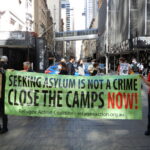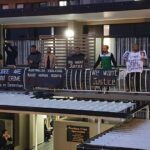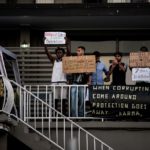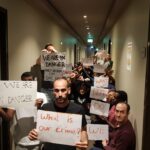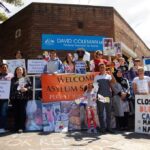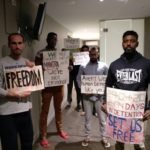Running the PM Out of Brisbane: An Interview With Refugee Solidarity Meanjin
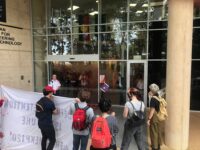
Just after prime minister Scott Morrison entered the Australian Institute of Bioengineering and Nanotechnology at Queensland University on the morning of 12 October, a group of refugee rights activists emerged out of nowhere to commence demonstrating.
The protesters doused the two glass sliding doors at the entrance to the building in red paint to signify the blood of detained refugees and asylum seekers. And they chanted that eight years of detention is too long, as well as suggesting to “lock up Scomo”.
Tuning in to the livestream footage of the event, one was taken by the fact that the small number of Queensland police officers – who eventually showed up to block the main entrance – were quite subdued compared to what’s been seen at other rallies around the nation of late.
The demonstration ended on a crescendo, as some of the activists were able to locate a back entrance, and on entering, they came face-to-face with the prime minister and his minders coming down a staircase.
The protesters then chased Morrison out of the building and into a waiting police van, as they called on him to release the refugees.
Indefinite detention
The front and centre demand of the demonstrators at Queensland University was that the Morrison government release the KP120, which is a group of around 120 former offshore asylum-seeking detainees currently being locked inside Brisbane’s Kangaroo Point Central Hotel.
These men were brought to Australia under the now revoked Medevac laws, as two independent doctors assessed it as necessary. However, since arriving in the country, they’ve been detained in the hotel, and treatment has been scarce.
There’s also another 60-odd former offshore detainees held in Melbourne’s Mantra Hotel.
During the nationwide pandemic lockdown, and the subsequent second wave shutdown of Melbourne, these men have all been left in the hotels without any means to physically distance or to protect themselves.
Private security firms watch over the men at the hotels, which are now referred to as alternative places of detention (APODs). And most of the guards employed have taken no safety precautions during the crisis, and in fact, one guard has tested positive to COVID-19 at each location.
A burgeoning movement
The successful mobilisation at Queensland University was led by Refugee Solidarity Meanjin: “a collective of community members based in Meanjin – so-called Brisbane – standing in solidarity with refugees and asylum seekers”.
The group was one of the main organisers behind the 24/7 Community Blockade out the front of Kangaroo Point Central, which began in mid-June. The action called for the release of refugees into the community. And the group has been staging substantial demonstrations ever since.
Sydney Criminal Lawyers spoke to a Refugee Solidarity Meanjin spokesperson about how they staged such a successful protest at the university, the way that they were able to conduct a second surprise rally the following day, and what it was like to run the PM out of town.
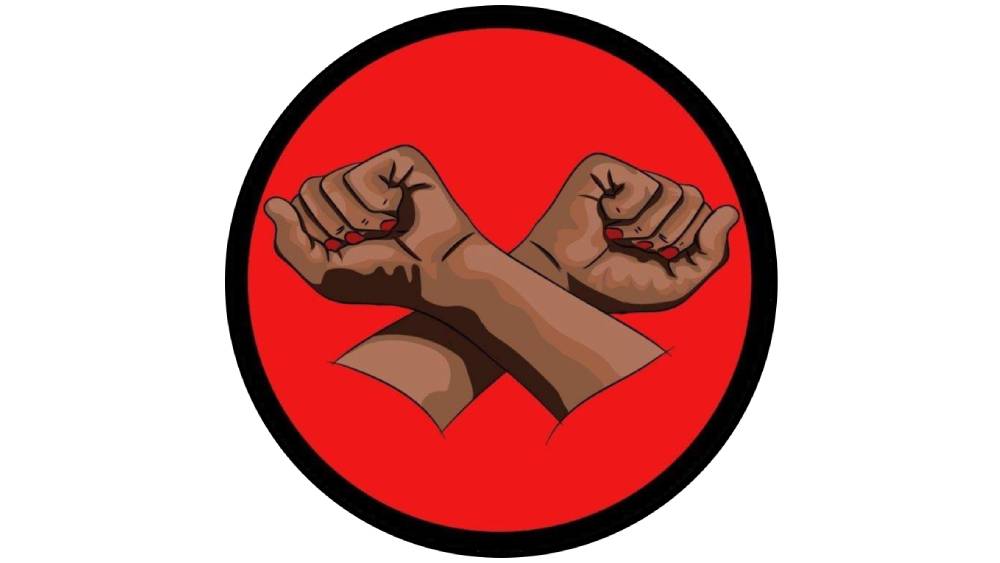
Considering what’s been taking place in regard to protests around the country of late, the response to the 12 October mobilisation at Queensland University seemed rather subdued.
Can you explain how the action came about, and why it didn’t receive a more heavy-handed response?
We knew he was going to come to town for the election. And we’re always on the lockout for actions to take.
Thanks to the 24/7 blockade, we now have a big network of interconnected activists that helped us with intel.
We could crowdsource and find out where he planned to be. And within that network, we planned a small action to confront him at the university.
It wasn’t public. There was no posting about it beforehand. We caught them by surprise.
We surrounded the building, acting very casually, and we let him enter. He entered with four security guards, but not much of a presence. Then once he was inside, we blocked the doors and kept him in there.
So, it was like that because they didn’t know we were going to be there, or that we knew where he was going to be. And the police response was quite delayed because of that.
There were a few access points to the building, and we’d managed to rally quite a few people by the end.
So, they were focused on escape over arresting people. They were focused on getting him out, not on stopping the action itself.
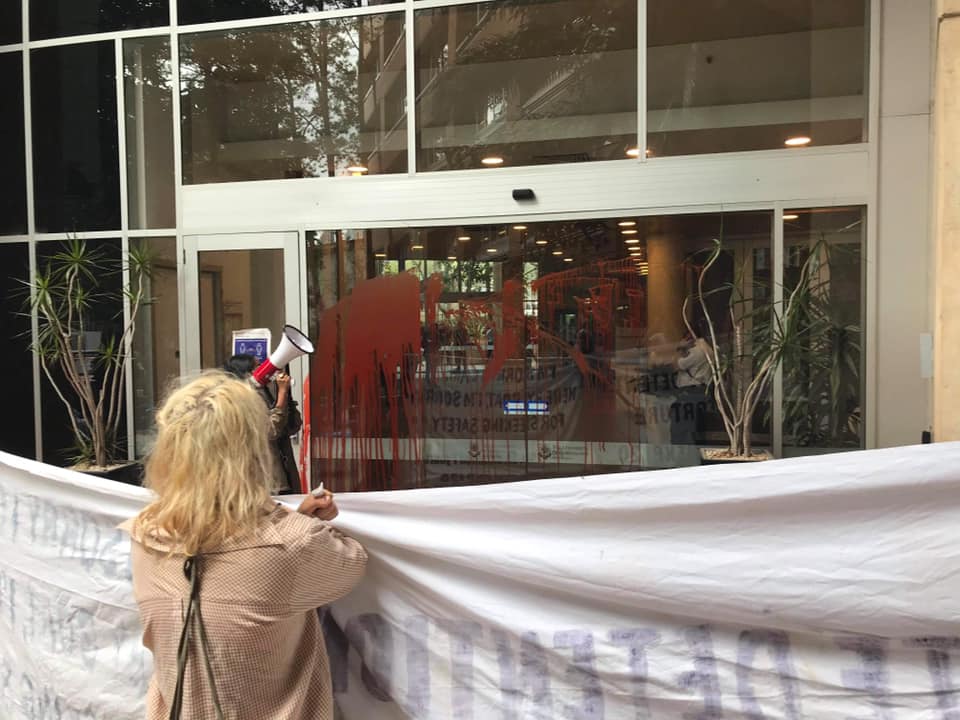
So, how would you describe what you were protesting last week?
We’re always protesting the indefinite detention of all people who came here for a safe place to live.
Often, we focus on the KP120, because they’re the ones that are locked up right in the middle of our own community at Kangaroo Point.
But we’re fighting in solidarity with the freedom struggle of all people who have come here looking for asylum.
Ultimately, we’re struggling in solidarity with all freedom struggles, and in particular First Nations people.
The action was further surprising as after it erupted at the front door, some activists were able to confront the prime minister close up and put their message across to him at the back of the building.
What happened there? And how was it possible?
Once we had the building locked down and we knew Scott Morrison was inside, we could tell that they wanted to find a way out.
I was scouting and noticed that there was a bridge to another building on the third floor, and we figured that was where they were most likely to take him out, but we hadn’t surrounded the other building.
So, a few of us went to that other exit. Two protesters then decided to go inside to see if they could get over to the other building, and as they were going up the steps, he came down with his bodyguards.
The security team had looked at all the other doors with around 15 people, fake blood and megaphones, so they decided that five people on the other exit was the best call.
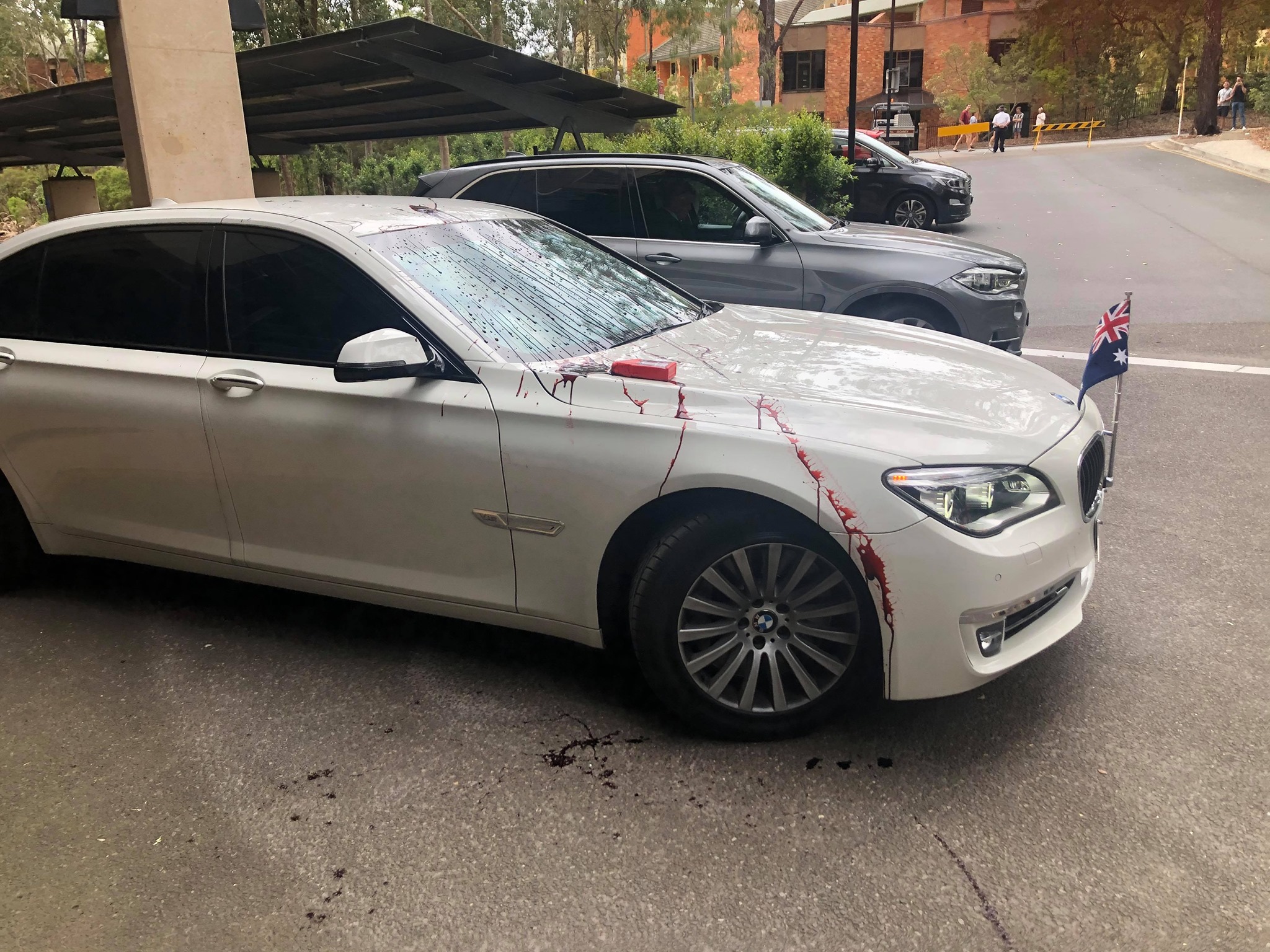
Following the action was there any backlash, or were participants arrested?
One person was arrested just afterwards, as they were trying to collect their things. But they really didn’t have much to do with it.
Another person was arrested a few days after and charged with a few trumped up charges, like public nuisance, which apparently means protesting in a way that police aren’t happy with. And we’ve got some lawyers willing to help them.
In terms of backlash, there’s always a bit of controversy when you take radical action.
There was backlash from people who think we should be doing things the polite way, and the same way we’ve always done them over the past seven years.
But that wasn’t the end of it, on the following day, your group was able to stage another protest at the Brisbane Convention Centre, where Morrison was again. What happened there?
The next day, we used a few tricks to find out where he would be again. We eventually did, and we also found out where he was before the fundraiser.
This is the benefit of having this broader resistance in Brisbane that we’ve been building from all different movements for a while.
People were staged along the route that he would take from the north of Brisbane to the convention centre, and we were getting updates that his motorcade had gone past.
We also had people around the convention centre giving us the heads-up when it was really close by.
So, we managed to chase the car, and throw some things, but they didn’t slow down. They sped up, and the police quickly moved him in. They were worried about a follow up it seemed.
We also had plans for the next day, but then he suddenly announced that he had urgent business in Sydney. So, that was the end of it.
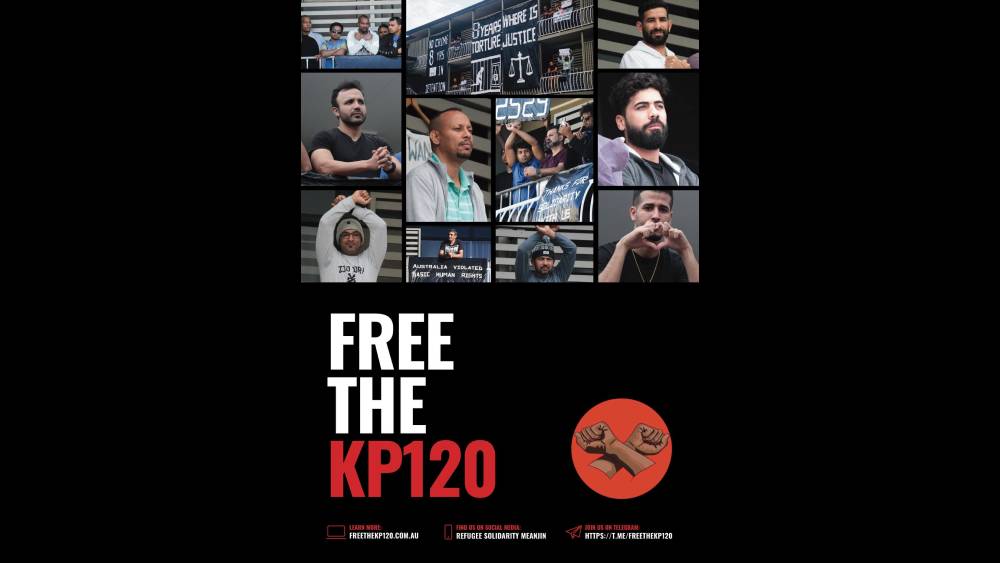
At the first action, activists were holding a sign that read “Indefinite Detention Is Torture”, as well as another placard quoting a refugee lamenting the fact that he’d come to Australia, as he’d thought he’d be receiving help here.
Can you speak about the way that the Australian government deals with people seeking asylum?
The Australian government is doing exactly what its intentions have been all along. Australia’s policy of torturing refugees and asylum seekers isn’t a breakdown of the system, it’s what it was built to do.
It’s not an accident that these people have been put in concentration camps. It’s what they wanted to do.
When doctors and activists fought for Medevac to get sick people transferred here, they then threw them in little cramped hotel rooms, with no access to the medical care they came for.
It’s been over a year of that. And they’re still in these hotel rooms now.
This is intentional. They deny them the basics to try and take away their humanity. We have a friend in there who has a painful wisdom tooth, but they don’t send him to a dentist to have it taken out. They just give him painkillers.
And lastly, what would you say your group has learnt from last week’s actions? And what’s the next step for Refugee Solidarity Meanjin?
We learnt, yet again, that radical action gets attention, gets people talking and builds a movement.
Causing a bit of controversy always gets the movement energised. And if you’re lucky you can run the prime minister out of town.
We’ve learnt to keep going with things that confront and challenge the system that has put these people in a cage for many years now.
For the future, we have a rally and mass action planned for 30 October at King George Square. And in general, we’ll be having more covert actions.
This is not going to stop until detention does.


